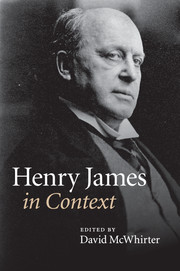Book contents
- Frontmatter
- Contents
- List of Illustrations
- Notes on Contributors
- Preface
- Abbreviations
- Chronology
- Part One Life and career, times and places
- Part Two Historical and cultural contexts
- Chapter 9 Aestheticism and Decadence
- Chapter 10 Authorship
- Chapter 11 Children
- Chapter 12 Consumer culture
- Chapter 13 Cosmopolitanism
- Chapter 14 Courtship, marriage, family
- Chapter 15 Ethics
- Chapter 16 Language
- Chapter 17 Law
- Chapter 18 Manners
- Chapter 19 Media and communication technologies
- Chapter 20 Modernism
- Chapter 21 Money and class
- Chapter 22 Museums and exhibitions
- Chapter 23 Nationalism and imperialism
- Chapter 24 Print culture
- Chapter 25 Psychology
- Chapter 26 Race
- Chapter 27 Realism and naturalism
- Chapter 28 Sexualities and sexology
- Chapter 29 Social sciences and the disciplines
- Chapter 30 Things
- Chapter 31 Time
- Chapter 32 Travel and tourism
- Chapter 33 Urbanity
- Chapter 34 Visual culture
- Chapter 35 Women and men
- Chapter 36 Work
- Part Three Reception
- Further reading
- Index
- References
Chapter 25 - Psychology
Published online by Cambridge University Press: 05 August 2014
- Frontmatter
- Contents
- List of Illustrations
- Notes on Contributors
- Preface
- Abbreviations
- Chronology
- Part One Life and career, times and places
- Part Two Historical and cultural contexts
- Chapter 9 Aestheticism and Decadence
- Chapter 10 Authorship
- Chapter 11 Children
- Chapter 12 Consumer culture
- Chapter 13 Cosmopolitanism
- Chapter 14 Courtship, marriage, family
- Chapter 15 Ethics
- Chapter 16 Language
- Chapter 17 Law
- Chapter 18 Manners
- Chapter 19 Media and communication technologies
- Chapter 20 Modernism
- Chapter 21 Money and class
- Chapter 22 Museums and exhibitions
- Chapter 23 Nationalism and imperialism
- Chapter 24 Print culture
- Chapter 25 Psychology
- Chapter 26 Race
- Chapter 27 Realism and naturalism
- Chapter 28 Sexualities and sexology
- Chapter 29 Social sciences and the disciplines
- Chapter 30 Things
- Chapter 31 Time
- Chapter 32 Travel and tourism
- Chapter 33 Urbanity
- Chapter 34 Visual culture
- Chapter 35 Women and men
- Chapter 36 Work
- Part Three Reception
- Further reading
- Index
- References
Summary
It could be argued that Henry James’s great subject was human psychology. That psychology, as a discipline and an aesthetic category, emerged almost contemporaneously with James’s literary career complicates such an argument. To address this convergence, we could place Henry James’s fiction in the explanatory context of nineteenth-century psychology and other discourses that conjured new forms of subjectivity. When James began writing fiction in the 1860s, thinkers interested in psychology were struggling to extricate the emerging discipline from centuries of metaphysical philosophical inquiry into the nature of the soul. The ‘laboratory revolution’ of the late nineteenth century redefined psychology as a physiological science based upon reaction-time experiments, cortical stimulation, dissection and vivisection rather than speculative inquiry. The ferment of positivism made it seem not only possible but also likely that laboratory science would ‘discover’ how the mind works and what human psychology, finally, is. Yet even those early psychologists most committed to physiological psychology, such as G. H. Lewes and Herbert Spencer, were unwilling to abandon older conceptions entirely. They paradoxically joined materialist/positivist explanations of human psychology as a product of classifiable and observable physical processes with idealist ones that attempted to preserve the elusive and unquantifiable qualities of the mind as creative force.
This paradox persists in recent discussions of consciousness in Henry James’s fiction. Despite the wide-ranging influence of post-structuralist theorizations of how human subjectivity and psychology are shaped and managed by external institutional discourses, James’s compelling evocation of the inwardness that we most associate with psychology makes it difficult to accept his fictional representations of consciousness as wholly determined by history or context. A number of literary critics have addressed this problem by emphasizing the extent to which James (surprisingly, given his long-standing reputation as the most ‘psychological’ of novelists) resisted and critiqued what has been termed ‘depth psychology’, or the idea that an individual’s real self, his real psychology are hidden deep inside of him. Such accounts, however, of the difference between ‘psychology’ (static and located inside discrete individuals) and ‘consciousness’ (wandering, decoupled from notions of individual subjectivity) in his work perhaps overstate the extent to which James’s fiction pits these differing categories against one another, given that neither of these terms had settled or agreed-upon meanings for either nascent psychologists or fiction writers of the era.
- Type
- Chapter
- Information
- Henry James in Context , pp. 270 - 279Publisher: Cambridge University PressPrint publication year: 2010
References
- 1
- Cited by



